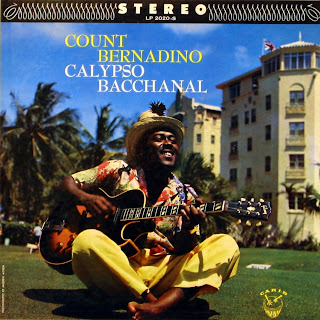 One of the main differences between prewar and postwar calypso is that the former primarily came from Trinidad, while the latter, more often than not, was made by musicians from the Bahamas. Indeed, this particular type of music was part of the exotica fad during the 1950s and early 1960s and was marketed accordingly by the record labels of the day. Unfortunately, the target audience had changed during this time, which often had a negative effect on the quality of the performances. Whereas the calypso 78s from the 1930s were intended for natives of the Caribbean living in the West Indies and in the expatriate communities of New York City and London, many of the postwar albums recorded by Bahamian musicians were clearly produced for white LP buyers whose tastes in music were slightly more adventurous than average. Little wonder, then, that so many of these releases were recorded in the hotels of Nassau where many of the calypso bands regularly performed to the delight of numerous American tourists. Without a doubt, a large number of these albums must have been sold as souvenirs to those who wanted a memento of their Caribbean vacations.
One of the main differences between prewar and postwar calypso is that the former primarily came from Trinidad, while the latter, more often than not, was made by musicians from the Bahamas. Indeed, this particular type of music was part of the exotica fad during the 1950s and early 1960s and was marketed accordingly by the record labels of the day. Unfortunately, the target audience had changed during this time, which often had a negative effect on the quality of the performances. Whereas the calypso 78s from the 1930s were intended for natives of the Caribbean living in the West Indies and in the expatriate communities of New York City and London, many of the postwar albums recorded by Bahamian musicians were clearly produced for white LP buyers whose tastes in music were slightly more adventurous than average. Little wonder, then, that so many of these releases were recorded in the hotels of Nassau where many of the calypso bands regularly performed to the delight of numerous American tourists. Without a doubt, a large number of these albums must have been sold as souvenirs to those who wanted a memento of their Caribbean vacations.Which brings us to this LP, which ranks among the better postwar calypso recordings and demonstrates that not everything in this genre had to be bland and watered-down for American consumption. Count Bernadino originally hailed from Abaco, one of the more remote islands of the Bahamas, but later spent time living in Nassau, Jamaica, and New York and further developed his singing and guitar skills in these locations. Bernadino received his big break after relocating to the Big Apple in 1947. While working at a restaurant as a dishwasher, the establishment's owner took note of his talent and allowed him to perform for customers during his breaks. Around the same time, Bernadino fell in with a group of Caribbean musicians and enrolled with them at the New York School of Music. This brought the band, the Bacannals, to the attention of booking agents who, in turn, helped established them as professional touring musicians in the United States for the next few years. Bernadino returned home to the Bahamas in the mid-1950s, where he performed regularly at clubs and other popular night spots. By the beginning of the following decade, he had been recruited by the country's Development Board to tour internationally in an effort to attract more visitors to the Bahamas. Thus Calypso Bacchanal, recorded in 1962 when Bernadino was regularly globe-trottining and playing the hotels of Nassau, finds him at the height of his powers.
While the tracks on this album may not possess the raw power of ska (which was just starting to establish itself in Jamaica at the time) or the supernatural bizarreness of fellow Bahamian Exuma's first four LPs, it gives the listener an indication of the heavier music from the West Indies that was to come in the following years. Certainly, this can be heard on the more rhythmic numbers like "Come On," "Go Down to Bimini," "Red Shoes," "Chinese Baseball" (?), and "Mama, Lay, Lay, Lay," which all showcase the expert contributions of Little Sparrow on steel pans, Rudy Pinder on drums, Roy Shurland on maracas, and a horn section that included Eddie White, Charles Emlok, and Lord Lynn. The remaining material consists primarily of story songs with Caribbean themes, which makes for good background music the next time you're sitting around with your friends and drinking white rum and Coca-Cola. The most interesting exception in this batch of songs is "Love Alone," an updated version of Trinidadian calypsonian the Caresser's "Edward the VIII," whose subject matter concerns the romance of the United Kingdom monarch (who, after his abdication, was the Governor of the Bahamas during World War II) and American socialite Wallis Simpson. Obviously, this story had made quite an impact on the British Empire's colonial subjects throughout the West Indies. Thanks to Record Fiend
listen here

Sem comentários:
Enviar um comentário